BusinessEurope Headlines No. 2018-23
Sustainability can be global force for change, while ensuring competitiveness of companies
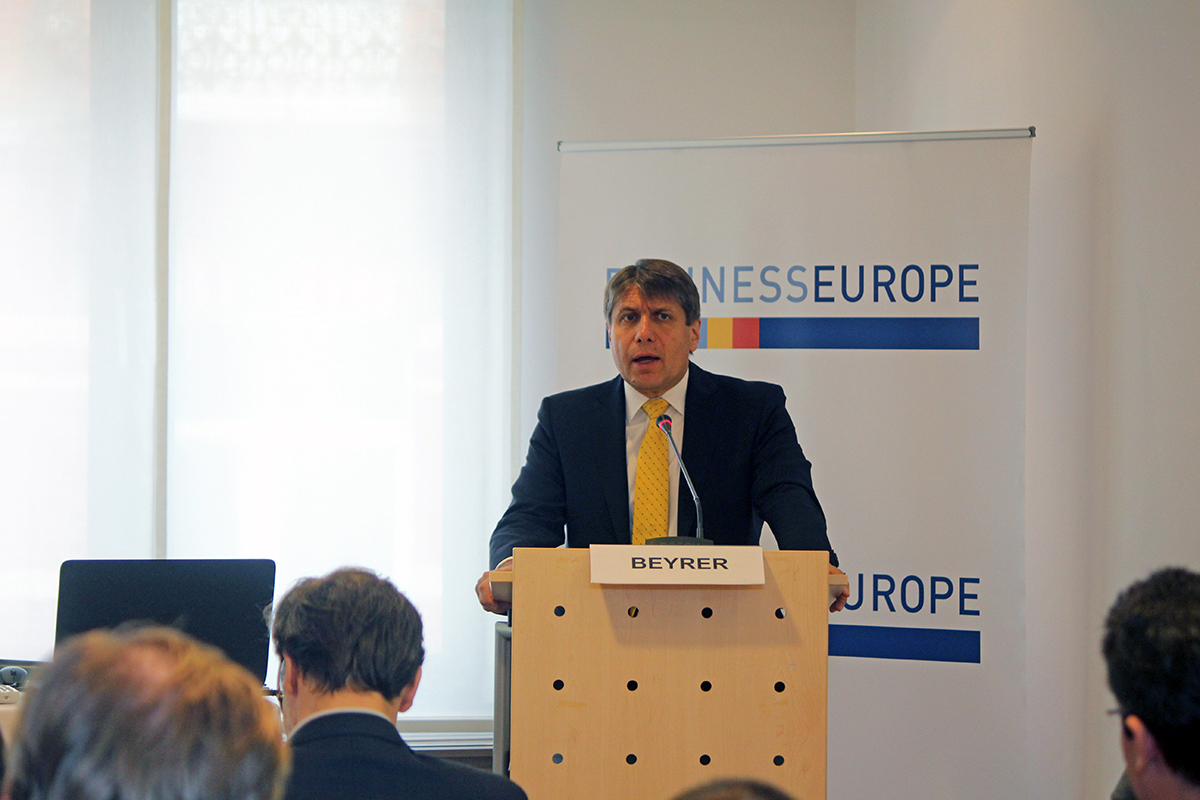
“The European business community is committed to sustainability and companies increasingly put it at the core of their business strategy. We look forward to discussing our engagement and commitments along with all stakeholders and partners, notably in the framework of the implementation of the United Nations Sustainable Development Goals”. This was the main message given by Director General Markus J. Beyrer at the BusinessEurope seminar on sustainability held in Brussels on 20 June, which gathered member federations and companies, representatives of the European Institutions, trade unions and NGOs. “There is a clear case for sustainability in all its dimensions: economic, social and environmental – which can be mutually reinforcing. The EU must take the lead in creating a global level playing field while ensuring the global competitiveness of companies and sectors involved”, Beyrer added.
![]() Contact: Rebekah Smith
Contact: Rebekah Smith
Our comment
New Company Law package can help remove red tape and provide companies more freedom of movement
By Pedro Oliveira, Director for Legal Affairs
 The recent Company Law package proposals attempt to fill an important gap in European Company Law. EU Company Law has so far pursued two main objectives: removal of red tape and enabling European companies to exercise their fundamental freedom of establishment. To accomplish those objectives, EU decision-makers traditionally looked at the legal reality in the Member States in search of hurdles that would make it harder for businesses to conduct their economic activity. Once identified, actions have been taken to address these hurdles.
The recent Company Law package proposals attempt to fill an important gap in European Company Law. EU Company Law has so far pursued two main objectives: removal of red tape and enabling European companies to exercise their fundamental freedom of establishment. To accomplish those objectives, EU decision-makers traditionally looked at the legal reality in the Member States in search of hurdles that would make it harder for businesses to conduct their economic activity. Once identified, actions have been taken to address these hurdles.
Despite substantial progress, companies still find it difficult to conduct business in another Member State for reasons related to, for example, registration of a new company, registration of changes in a company, creation of subsidiaries, or transfer of a company’s seat.
The digital age requires a change of mindset when looking at company law and corporate governance. Processes in companies are dematerialising. The cloud, digital applications and remote IT services are replacing (and redefining) the traditional office space and are taking charge of accounting, logistics and communications. Digital tools have the potential not only to break down barriers to cross border trade but also to change the way companies are run.
After previous attempts (e.g. Single Member Company proposal, European Private Company) to create a more agile legal environment for companies in the digital age, the Company Law Package is an ambitious attempt to reboot the momentum.
BusinessEurope welcomes the EU Company Law Package which set on positive -anti-red tape - principles such as the “do it once only”. Nevertheless, the proposals need to remain focused on the right objectives (and feasible ones from a company law perspective) which are to ensure an effective right - clearly recognised by the EU treaties - of establishment in the EU as well as to bring company law into the 21st-century. These objectives should be met without prejudice to the rights to company stakeholders (shareholders, creditors and workers).
However, this goal should not be undermined by attempts to pursue other objectives such as the fight against tax evasion and non-compliance with social rights. There are other more appropriate tools at EU and national level to address those concerns. The proposed new procedures for conversions and divisions are complex and filled with avoidable duplications. We should ensure trustworthiness of the framework to avoid abuse, but in a proportionate way.
BusinessEurope will continue to work on this proposal and produce a deeper assessment and ideas to make it right. On 21 June hearing, it will give members of the Legal Affairs Committee of the European Parliament its first assessment of the proposal. BusinessEurope will also co-organise an event of this package on 29 June together with the Association of Chartered Certified Accountants (ACCA) and the European Association of Craft, Small and Medium-sized Enterprises (UEAPME), bringing together decisions-makers and all relevant stakeholders (e.g. trade unions, notaries, etc).
Contact: Pedro Oliveira
Czech member SPCR celebrates 100 years anniversary with conference on future of industry
 On Monday, 18 June, Director General Markus J. Beyrer held a keynote speech on the occasion of the 100 years anniversary conference of the Czech BusinessEurope member SPCR. The theme of the day was “The Future of Industry - a challenge for innovation”. In his speech, DG Beyrer underlined the urgency to develop a future-oriented and coherent industrial policy for Europe, based on its competitive strengths. The Czech Republic, as one of the most industrialized countries of the EU, can be a role model for other European regions on how to maintain a strong industrial base. However, as current transformations like the digitalisation and automation of industry happen at a much faster pace than previous ones, a pro-active Industrial Strategy must be a priority also on European level. “The EU and its Member States must react swiftly to current trends and continue to implement reforms that are necessary to modernise our economies and societies. A future-proof budget planning for the Multiannual Financial Framework and a comprehensive skills agenda to re-skill our workforce will be crucial first steps”, Beyrer stressed.
On Monday, 18 June, Director General Markus J. Beyrer held a keynote speech on the occasion of the 100 years anniversary conference of the Czech BusinessEurope member SPCR. The theme of the day was “The Future of Industry - a challenge for innovation”. In his speech, DG Beyrer underlined the urgency to develop a future-oriented and coherent industrial policy for Europe, based on its competitive strengths. The Czech Republic, as one of the most industrialized countries of the EU, can be a role model for other European regions on how to maintain a strong industrial base. However, as current transformations like the digitalisation and automation of industry happen at a much faster pace than previous ones, a pro-active Industrial Strategy must be a priority also on European level. “The EU and its Member States must react swiftly to current trends and continue to implement reforms that are necessary to modernise our economies and societies. A future-proof budget planning for the Multiannual Financial Framework and a comprehensive skills agenda to re-skill our workforce will be crucial first steps”, Beyrer stressed.
Contact: Jasmin Ploner
Employee training is key in responding to changing labour market needs
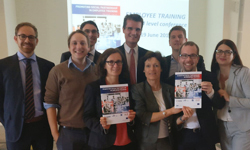 There is a growing trend in the EU for companies to provide training and for workers to participate in training. In the context of companies’ evolving skills requirements, especially as a result of digitalisation, it is important that training creates added value for companies and workers alike. Therefore, skills training needs to respond to an identified labour market need. This was a key message given by Maxime Cerutti, Director for Social Affairs, during a European social partners conference on 19 June. The conference presented and discussed the outcomes from the European social partners project on “promoting social partnership in employee training”. The project involved research work and cluster seminars with national social partner representatives in 12 Member States and will feed into the ongoing discussions at EU level about the future of vocational education and training policy beyond 2020.
There is a growing trend in the EU for companies to provide training and for workers to participate in training. In the context of companies’ evolving skills requirements, especially as a result of digitalisation, it is important that training creates added value for companies and workers alike. Therefore, skills training needs to respond to an identified labour market need. This was a key message given by Maxime Cerutti, Director for Social Affairs, during a European social partners conference on 19 June. The conference presented and discussed the outcomes from the European social partners project on “promoting social partnership in employee training”. The project involved research work and cluster seminars with national social partner representatives in 12 Member States and will feed into the ongoing discussions at EU level about the future of vocational education and training policy beyond 2020.
![]() Contact: Robert Plummer
Contact: Robert Plummer
Exchanging views with the European Business Organisation Worldwide Network
 BusinessEurope organised a meeting with representatives of the European Business Organisation Worldwide Network (EBO WWN) on 20 June on the occasion of their visit to Brussels. The meeting offered an opportunity to continue the constructive dialogue that started last year, and to discuss how to cooperate even more in the future with EBO WWN and individual EBOs on issues of common interest. In a context of increasing global protectionism and tensions in international trade, participants discussed priorities and long-term strategies to establish a level playing field and an effective multilateral system. “Cooperation is the key element in the current international context. We are extremely concerned with unilateral actions and present tensions, including between the U.S. and China”, said Luisa Santos, Director for International Relations at BusinessEurope.
BusinessEurope organised a meeting with representatives of the European Business Organisation Worldwide Network (EBO WWN) on 20 June on the occasion of their visit to Brussels. The meeting offered an opportunity to continue the constructive dialogue that started last year, and to discuss how to cooperate even more in the future with EBO WWN and individual EBOs on issues of common interest. In a context of increasing global protectionism and tensions in international trade, participants discussed priorities and long-term strategies to establish a level playing field and an effective multilateral system. “Cooperation is the key element in the current international context. We are extremely concerned with unilateral actions and present tensions, including between the U.S. and China”, said Luisa Santos, Director for International Relations at BusinessEurope.
Contact: Eleonora Catella
Industry groups and world's five largest intellectual property offices bolster joint cooperation agenda
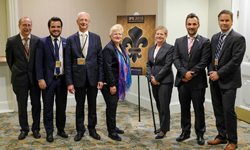 BusinessEurope and its partners from the U.S., Japan, Korea and China met in New Orleans with the Heads of the Intellectual Property Offices from their regions on 12-13 June. The aim of the meeting was to share updates on the state of play of ongoing procedural harmonisation projects as well as engage in a dialogue on intellectual property (IP) topics of strategic nature, such as quality and future development and direction of IP5 cooperation (e.g. artificial intelligence and its impact on the patent systems). Both the IP office and industry representatives pledged to maintain and further enhance this strategic cooperation.
BusinessEurope and its partners from the U.S., Japan, Korea and China met in New Orleans with the Heads of the Intellectual Property Offices from their regions on 12-13 June. The aim of the meeting was to share updates on the state of play of ongoing procedural harmonisation projects as well as engage in a dialogue on intellectual property (IP) topics of strategic nature, such as quality and future development and direction of IP5 cooperation (e.g. artificial intelligence and its impact on the patent systems). Both the IP office and industry representatives pledged to maintain and further enhance this strategic cooperation.
Contact: Ilias Konteas
Business and consumers concerned about trade disruption
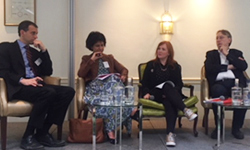 BusinessEurope Director for International Relations Luisa Santos participated in a multi-stakeholder forum entitled Consumer Protection in a Connected World hosted by the Transatlantic Consumer Dialogue on 19 June in Brussels. Alongside Monique Goyens, Director General of BEUC - the European Consumer Organisation, Bernd Lange, Member of the European Parliament (MEP), and Robert Weissman, President of Public Citizen, a nonprofit consumer advocacy organization, Luisa Santos took part in the opening session aiming at highlighting current realities in transatlantic relations. “Business and consumers have nothing to gain from trade disruption. A stable and predictable environment with well-defined rules is important to ensure sound competition”, she said. Talking about the current trade environment, Santos stressed: “We can discuss how to improve the world trading rules but we should not play outside them. Increasing unilateral actions jeopardise the system without creating a viable alternative”.
BusinessEurope Director for International Relations Luisa Santos participated in a multi-stakeholder forum entitled Consumer Protection in a Connected World hosted by the Transatlantic Consumer Dialogue on 19 June in Brussels. Alongside Monique Goyens, Director General of BEUC - the European Consumer Organisation, Bernd Lange, Member of the European Parliament (MEP), and Robert Weissman, President of Public Citizen, a nonprofit consumer advocacy organization, Luisa Santos took part in the opening session aiming at highlighting current realities in transatlantic relations. “Business and consumers have nothing to gain from trade disruption. A stable and predictable environment with well-defined rules is important to ensure sound competition”, she said. Talking about the current trade environment, Santos stressed: “We can discuss how to improve the world trading rules but we should not play outside them. Increasing unilateral actions jeopardise the system without creating a viable alternative”.
Contact: Luisa Santos
Tax groups meet upcoming Austrian EU Presidency
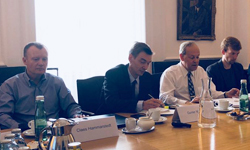 BusinessEurope’s Tax & Value Added Tax (VAT) groups, with the help of the Federation of Austrian Industries, met in Vienna on 13-14 June and welcomed officials from the Austrian Ministry of Finance, including Gunter Mayr, the Director-General for Tax policy. In light of the upcoming Austrian Presidency of the Council of the European Union, the Tax-group underlined during the meeting that there needs to be a greater focus on supporting growth and investment in the development of EU tax policy. In addition, the VAT-group noted that, while we support the creation of a single VAT-area, the proposed charging of VAT on cross-border trade between businesses, will significantly increase compliance costs.
BusinessEurope’s Tax & Value Added Tax (VAT) groups, with the help of the Federation of Austrian Industries, met in Vienna on 13-14 June and welcomed officials from the Austrian Ministry of Finance, including Gunter Mayr, the Director-General for Tax policy. In light of the upcoming Austrian Presidency of the Council of the European Union, the Tax-group underlined during the meeting that there needs to be a greater focus on supporting growth and investment in the development of EU tax policy. In addition, the VAT-group noted that, while we support the creation of a single VAT-area, the proposed charging of VAT on cross-border trade between businesses, will significantly increase compliance costs.
Contact: Pieter Baert
Regulatory scrutiny in the EU - support for Regulatory Scrutiny Board work
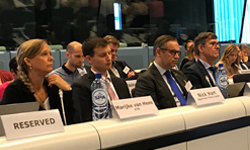 On 15 June the Regulatory Scrutiny Board organised the 2nd Annual Conference on Regulatory Scrutiny in the EU, which was opened with a speech by the European Commission First Vice-President Frans Timmermans. The event brought together representatives of EU institutions, the Organisation for Economic Co-operation and Development (OECD), think tanks, research and stakeholder communities. In the discussant panel, BusinessEurope was represented by Jens Hedström, Chair of Better Regulation Working Group. “We commend the work done by the Regulatory Scrutiny Board in improving the EU regulatory practices to date, moving towards real evidence-based policy choices”, Hedström said. “We should build on this and reinforce the Board's mandate so that it can address systemic regulatory scrutiny issues. It's a matter of building trust among all players”, he added. Additional points were made in relation to quality of public consultations, their link to impact assessments, transparency (including the need for publication of draft impact assessments), ex-post evaluations of the regulatory frameworks, the need to better explain the Commission's Regulatory Fitness and Performance (REFIT) workstream choices.
On 15 June the Regulatory Scrutiny Board organised the 2nd Annual Conference on Regulatory Scrutiny in the EU, which was opened with a speech by the European Commission First Vice-President Frans Timmermans. The event brought together representatives of EU institutions, the Organisation for Economic Co-operation and Development (OECD), think tanks, research and stakeholder communities. In the discussant panel, BusinessEurope was represented by Jens Hedström, Chair of Better Regulation Working Group. “We commend the work done by the Regulatory Scrutiny Board in improving the EU regulatory practices to date, moving towards real evidence-based policy choices”, Hedström said. “We should build on this and reinforce the Board's mandate so that it can address systemic regulatory scrutiny issues. It's a matter of building trust among all players”, he added. Additional points were made in relation to quality of public consultations, their link to impact assessments, transparency (including the need for publication of draft impact assessments), ex-post evaluations of the regulatory frameworks, the need to better explain the Commission's Regulatory Fitness and Performance (REFIT) workstream choices.
![]() Contact: Martynas Barysas or Basje Bender
Contact: Martynas Barysas or Basje Bender
Remedies in public procurement – a business perspective
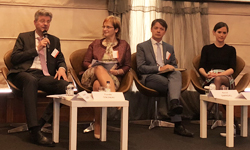 BusinessEurope Adviser Basje Bender participated in a panel on public procurement remedies on 15 June. The panel was part of a conference on Public Procurement in Sofia organised by the European Commission’s Directorate General for Internal Market, Industry, Entrepreneurship and SMEs (DG GROW). “When it comes to remedies, speed, price and quality are all important for companies. Review bodies therefore need sufficient expertise and resources to deliver”, she said, adding: “using remedies is something that companies do not take lightly, both because of the costs involved and because it affects your reputation. If anything, the solution to so-called ‘frivolous claims’ should be to enhance the speed of the review process”. Bender also stressed that while further convergence in the area of remedies is welcome, BusinessEurope would not like to see the current directives reopened at this point in time, as companies need a stable legal framework to operate.
BusinessEurope Adviser Basje Bender participated in a panel on public procurement remedies on 15 June. The panel was part of a conference on Public Procurement in Sofia organised by the European Commission’s Directorate General for Internal Market, Industry, Entrepreneurship and SMEs (DG GROW). “When it comes to remedies, speed, price and quality are all important for companies. Review bodies therefore need sufficient expertise and resources to deliver”, she said, adding: “using remedies is something that companies do not take lightly, both because of the costs involved and because it affects your reputation. If anything, the solution to so-called ‘frivolous claims’ should be to enhance the speed of the review process”. Bender also stressed that while further convergence in the area of remedies is welcome, BusinessEurope would not like to see the current directives reopened at this point in time, as companies need a stable legal framework to operate.
Contact: Basje Bender
Calendar
- 22 June: BusinessEurope publishes Economic Outlook
- 28-29: European Council
- 29 June: EU company law "upgraded" package: making the best of digital solutions and cross-border mobility
- 1 July: Austrian presidency of the Council of the European Union
Reminder: please take a look at our revised privacy policy